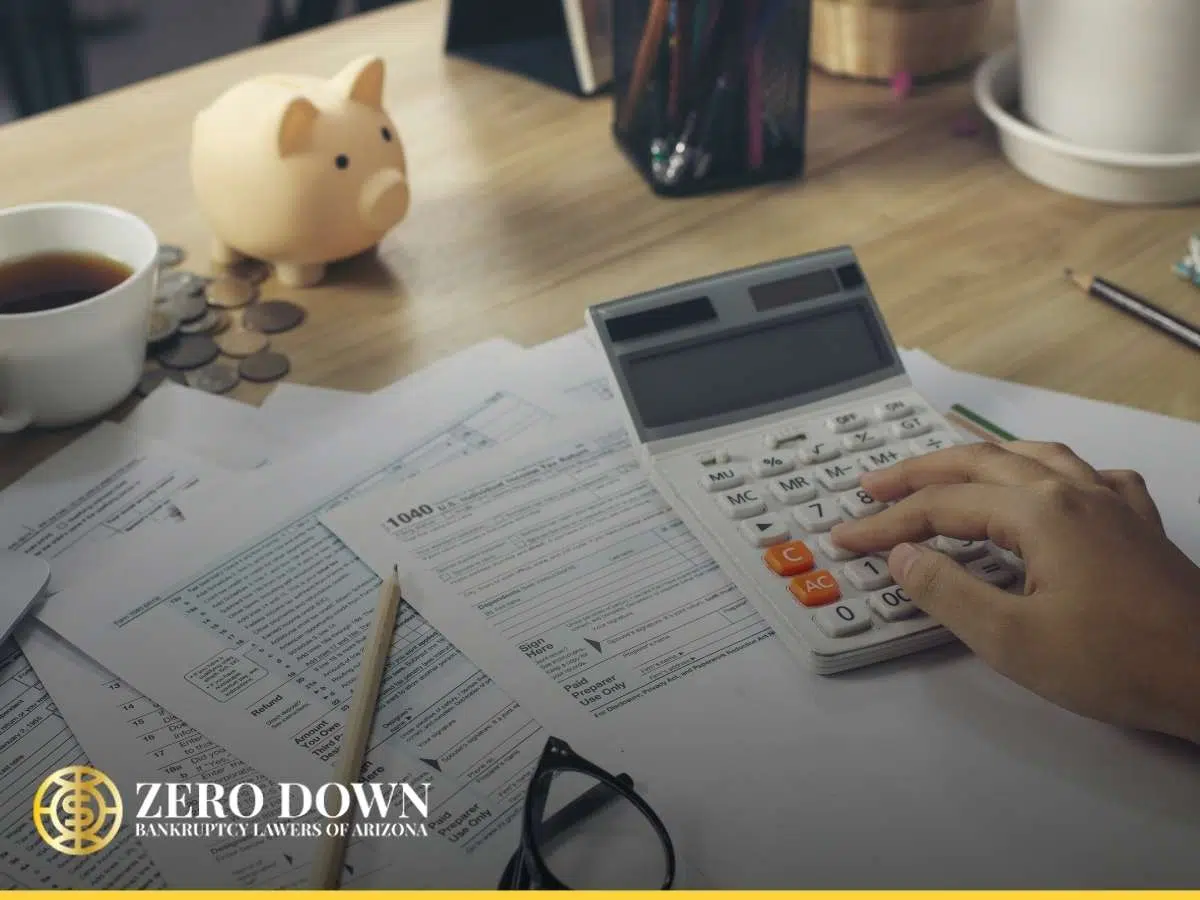Could You Lose Your Tax Refunds If You File For Bankruptcy?
Some people assume that if you declare bankruptcy, you must give up all your assets. This isn’t true as a blanket statement, but some of your assets may be at risk in a bankruptcy filing. One asset that people considering bankruptcy tend to forget about is their potential tax refunds. Depending on how your case filing is timed, your tax refund could be subject to seizure by your bankruptcy trustee. Arizona is one of only two states in the country that take bankruptcy debtors’ tax refunds. Arizona also doesn’t allow for the use of federal bankruptcy exemptions, which offer a wildcard protection that could theoretically be applied to a tax refund. Lawmakers are looking to change this, but they face obstacles, including bankruptcy trustees themselves. Read on to learn more about this situation, and if you have additional questions or concerns about your tax refund and filing bankruptcy, call our office at 480-470-1504.
Arizona Bankruptcy Exemptions
Bankruptcy exemptions are applied to your assets on your bankruptcy petition, protecting them from being used as payment for your creditors. There are federal bankruptcy exemptions, and states offer their own exemptions for their residents as well. Some states offer their bankruptcy debtors the option between state and federal exemptions, while others- like Arizona- don’t.
Some Arizona bankruptcy exemptions may not cover high-value assets in which you hold significant equity. In 2022, the homestead exemption in Arizona was increased from $150,000 to $250,000. This exemption, unlike many other bankruptcy exemptions, doesn’t double for married couples. However, it can also be applied to cash proceeds from a home sale for up to 18 months. If your home’s value shot up with the recent housing market boom in Arizona, this increase could be invaluable in a bankruptcy filing. Arizona also offers exemptions for motor vehicles, household goods and furnishings, prepaid rent and security deposits, food, clothes, books, tools, and more. Two exemptions that Arizona doesn’t offer include a tax refund exemption, and a wildcard exemption. A wildcard exemption is one that can be applied to any asset of the debtor’s choosing. This leaves no exemption that can be used to protect your tax refund if you file bankruptcy.
What Happens To My Tax Refund If I File Bankruptcy?
The vast majority of people seeking to file bankruptcy in Arizona will choose between Chapter 7 and Chapter 13. The chapter you file will influence how your tax refund is treated in bankruptcy.
If someone is filing Chapter 7 bankruptcy and is concerned about keeping their tax refund, we generally try to guide that client towards waiting until after they have spent their tax refund to file their bankruptcy. As long as the debtor spends the tax refund on reasonable items, it will be safe from the trustee. This is the time to get that dental procedure you’ve been putting off, or finally have the mechanic inspect the cause of your check-engine light. You can also use your tax refund to pay for your bankruptcy costs, including your attorney’s fees, up front. For more ideas on reasonable ways to spend your tax refund before filing, click here to schedule your free bankruptcy consultation.
You might be in a pressing financial situation that doesn’t allow you to wait to file until you have spent your tax refund. If so, the amount the trustee is subject to take is based on when in the year you file. This is true even if your case is discharged before you receive your tax refund. If your case was filed in February, the trustee could take 2/12 of your tax refund, but if it was filed in April, the trustee could take 4/12. If your tax refund is a major part of your annual budget, you need to tread carefully here in a bankruptcy filing.
In Chapter 13 bankruptcy, your debts will be reorganized into a payment plan lasting 3-5 years that is overseen by the bankruptcy trustee. Bankruptcy costs, secured debts, and priority debts must all be paid fully in this plan, but unsecured nonpriority debts may be discharged if the debtor doesn’t have sufficient disposable monthly income to pay off these debts during their plan. However, the trustee is likely to seize a Chapter 13 debtor’s tax refund under these circumstances. Unless the Chapter 13 payment plan fully repays all debts or the debtor’s tax refund is nominal, they can expect it to be taken by the bankruptcy trustee each year of their case. If you want to petition the court to allow you to keep your tax refund due to severe financial circumstances, you will need to provide a good reason to the court and do so each year you wish to protect your tax refund.
Senate Bill 1222
It isn’t lost on lawmakers that tax refunds are highly beneficial for bankruptcy debtors to keep, and Arizona is among a small minority in taking tax refunds in bankruptcy. Families who rely on these tax refunds face this major obstacle if they declare bankruptcy. That’s why lawmakers in Arizona are working on enacting SB 1222. This bill allows Arizona bankruptcy debtors to keep the lesser of their combined state and federal income tax refunds, or their combined state and federal child tax credits.
With times as tough as they are right now financially, it seems ludicrous that anyone would oppose bankruptcy debtors getting to keep their tax refunds. It would not be the IRS keeping the money in this situation- here, the trustee will divide it amongst the debtor’s creditors and keep a portion for himself. Arizona trustees get to keep one-quarter of what they take from families who file bankruptcy. Clearly, bankruptcy trustees have a huge incentive to oppose SB 1222. So do common creditors named in bankruptcy filings, like credit card companies and auto lenders. But just because things have always been a certain way doesn’t mean that it shouldn’t change. When Arizona families are struggling with debt, they should get to keep their tax refunds- not relatively wealthy bankruptcy trustees.
The Arizona Law Team To Make Sure You Get the Most Out of Your Bankruptcy Filing
Filing bankruptcy is stressful and complicated, and you will be disqualified from discharging your debts again for several years after your original filing. Our Arizona bankruptcy lawyers strive to make sure that our clients’ cases go off without a hitch, so every possible debt is included, and every possible dollar stays in our clients’ pockets. While paying your legal fees up front can be a great way to spend your tax refund before bankruptcy, we understand that isn’t an option for everyone. We also offer post-filing payment plans for eligible clients starting at Arizona Zero Down Bankruptcy Lawyers. To learn more, call 480-470-1504 or click here to request your free consultation with an experienced member of our bankruptcy team.
Arizona Offices
Phoenix Location:
343 W Roosevelt Street, Suite #100
Phoenix, AZ 85003
Email: [email protected]
Phone: 602-609-7000
Mesa Location:
1731 West Baseline Rd., Suite 101
Mesa, AZ 85202
Email: [email protected]
Glendale Location:
20325 N 51st Avenue, Suite #134
Glendale, AZ 85308
Email: [email protected]
Tucson Location:
2 East Congress, Suite #900
Tucson, AZ 85701
Email: [email protected]










